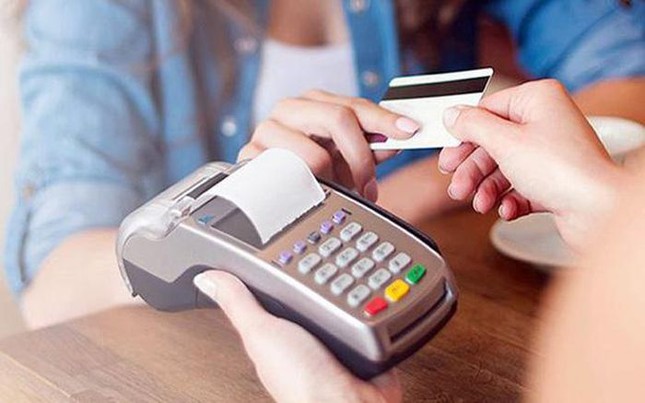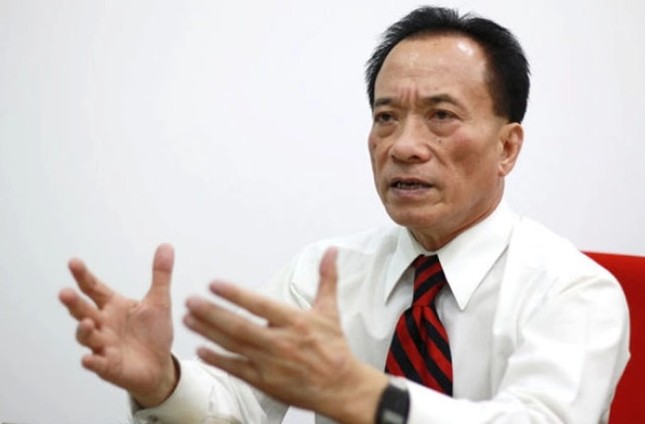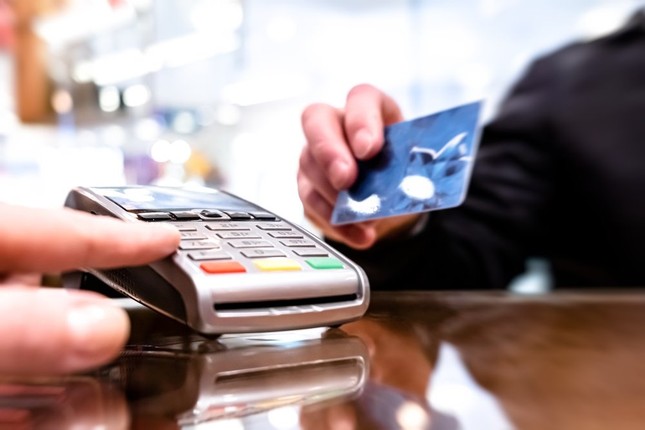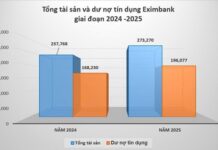The story of a customer in Quang Ninh opens a credit card at Eximbank and incurs a debt of over 8.5 million VND but does not pay, 11 years later this debt increases to over 8.8 billion VND causing a stir in public opinion. From this incident, many people are worried about whether they are “debtors” to the bank when opening a credit card. Sharing with the Tiền Phong newspaper, financial experts advise using credit cards wisely, as well as analyzing the errors in this unique story.
Silent Debt
Personal finance expert Lâm Minh Chánh believes that credit cards are a great convenience of life. It allows us to spend without cash, especially without interest for 45 – 60 days from the date of use (depending on the bank).

Personal finance expert Lâm Minh Chánh.
Credit cards are particularly necessary when traveling abroad, especially in developed countries where cash is rarely used. Credit cards are also very convenient for online shopping, especially on international websites that only accept credit card payments. Sometimes credit cards are also used as an emergency tool, and the amount borrowed can be up to 80 – 90% of the card value. Of course, the interest rate will be much higher than that of banks, but still lower than that of consumer loans.
Lâm Minh Chánh points out that when using a credit card for spending after the interest-free period, customers must pay off their debts within 45-60 days. Beyond this period, the user must pay a high penalty and interest rate, which can be as high as 4-6% per month, depending on the bank.
In the case of a customer who had debt of 8.5 million VND which turned into 8.8 billion VND after 132 months (11 years), the interest rate and penalty are 5.4% per month, equivalent to 88% per year. The late payment penalties and interest rates are stated in the signed contract and are still in accordance with the law.
“After the 45-60 days (excluding interest), the interest rate on credit cards is extremely high. Therefore, customers must pay immediately, and should not let the debt go beyond that time”- emphasized financial expert Lâm Minh Chánh.
According to Mr. Chánh’s perspective, in the case of a credit card debt of billions of VND as mentioned above, there seems to be a problem with the contract and card issuance. Between customers and banks, there is conflicting information.

Consumers need to understand when using credit cards
“According to the law, if customers can prove that the bank has no interaction with the customer to prove that the customer knows they are in debt to the bank, then after 2 years, the bank cannot file a commercial lawsuit”- said Mr. Chánh.
Answering questions about the concerns of many people who have provided their phone numbers to bank employees, fearing that they have a credit card and “silent” debt, Mr. Chánh clearly stated that in order to issue a credit card to a customer, the bank must check relatives, personal credit scores, and have copies of personal documents and customer signatures. Banks cannot issue credit cards based on customer phone numbers. Therefore, consumers should not be too worried if they have not provided documents and have not signed anything.
“Credit cards are very convenient, but consumers must read and understand the contract before signing in order to avoid regrettable accidents”- Mr. Chánh noted.
“Look before you leap”
Dr. Nguyễn Trí Hiếu – a banking and financial expert said that many credit card users are confident that if they are late in paying off credit card debts by 1-2 days, the bank will only charge interest for those 1-2 days. But actually, it is not. The bank will start charging interest from the date of the consumer’s purchase, which is about 1 month earlier.
In the US, many people believe that if they have income in the future, they can use that future income to pay off a debt that is currently occurring. In modern life, financial needs are increasing, so credit cards must be used.

Dr. Nguyễn Trí Hiếu – banking and financial expert.
“As for me personally, I will never use a credit card. If I have cash, I will use it. If I run out of money, I will accept hunger rather than use a credit card”- Mr. Hiếu shared.
Also according to Mr. Hiếu, banks when issuing credit cards usually require customers to view general regulations, and they usually open the card and send it to the customer’s address. Customers need to view detailed instructions in order to understand them. After receiving the card, they need to go to an ATM to activate it before they can use it. That is certain. Mr. Hiếu believes that in the case of customers owing up to billions of VND, they may not be aware of such instructions.
“In order to use credit cards safely, cardholders must understand all usage instructions; set passwords and keep them confidential; pay debts on time to avoid interest charges. What’s more important is to “look before you leap”, meaning when buying something, you must consider whether you have the ability to repay the debt or not. Banks often use the debt ratio per month divided by the person’s income. The safest ratio is 50%. The higher this ratio is, the riskier it is”- Mr. Hiếu said.
This banking expert expressed surprise at the debt amount increasing from a few million VND to nearly 10 billion VND within just over 10 years from a credit card.
“Even with double interest compounding, which means that the principal and interest compete with fines, I don’t see a way to reach such a huge amount. Specifically, the debt after about 90 days of non-payment should have already stopped accruing interest. However, Eximbank still charges interest. I also don’t understand whether the bank is doing this in accordance with the law or not? I am looking forward to the State Bank announcing the results for everyone to know”- said Dr. Nguyễn Trí Hiếu.
Hazy People, Weak Banks
Dr. Đinh Thế Hiển – an economic expert, said that this incident sometimes is a good thing for both the people and the banks, although it seems to be a quite shocking event.
Analyzing deeper, Mr. Hiển noted that citizens, even if they owe a small amount of money, if they are not careful, they may accidentally not pay their debts and will have a lot of trouble. Specifically, like the customer in Quang Ninh, when he needed a loan from the bank, he couldn’t get it because of bad debts, even though the bad debt was only 10 million VND.

Economic expert Đinh Thế Hiển.
“Even though it’s a really small debt, if it is stuck in the bank, it is very difficult to access borrowing capital later. Therefore, when borrowing money from banks, we must be mindful of the repayment period; when working with banks, we must always base on legal regulations rather than blindly trust”- Mr. Hiển emphasized.
According to Mr. Hiển, even if borrowing at a low-interest rate for a long period of time, it will still not have much impact on the repayment. For example, borrowing 100 million VND at an interest rate of 10% per year for 10 years, the total amount of both principal and interest to be paid at the most is doubled. But it’s still the same amount, but if the interest rate is 20%, it is problematic.
With a period of 10 years, this amount of interest can reach 1-2 billion VND. If the two-way credit card interest rate is close to 100%, then the debt becomes enormous. For example, a debt of 10 million VND increasing to nearly 9 billion VND as in the case of the customer in Quang Ninh. Thus, the interest rate is very important and borrowers must pay attention to the interest rate.
Assessing credit cards, Dr. Đinh Thế Hiển said that this is a development of the modern economy, but if we do not know how to use them well, accidents are likely to occur. In the US, there is an entire education system to teach how to use cards, which is the foundation of personal finance. But in Vietnam, it is not yet included in the general education system.

The incident of a debt of 8.8 billion VND from an amount of 10 million VND from a credit card, Mr. Đinh Thế Hiển believes that for this incident to happen, it reflects the incompetence and irresponsibility of the bank.
In addition, people have not equipped themselves with knowledge when using credit cards. Consumers need to equip themselves with knowledge about credit cards in particular and money and financial tools in general.
In terms of banks, Mr. Hiển believes that it has shown mechanical process and irresponsibility, relying only on its own legal basis without considering the benefits of users.
“This incident not only tarnishes the bank’s image but also shows the weakness of this bank in its relationships from headquarters to specialized directors such as retail directors, regional directors, and branch directors…”- said Mr. Hiển.
In response to the question of whether “Credit consumer cards will be boycotted or not after the incident of the debt of 8.5 million VND soaring to 8.8 billion VND?”, Dr. Đinh Thế Hiển affirmed: “I think they won’t, but people will pay more attention, learn to use credit cards more safely. The bank will also enhance its responsibility and improve its services. In conclusion, in my opinion, this incident is sometimes good for consumer finance in particular and for the development of the monetary system in general”.















